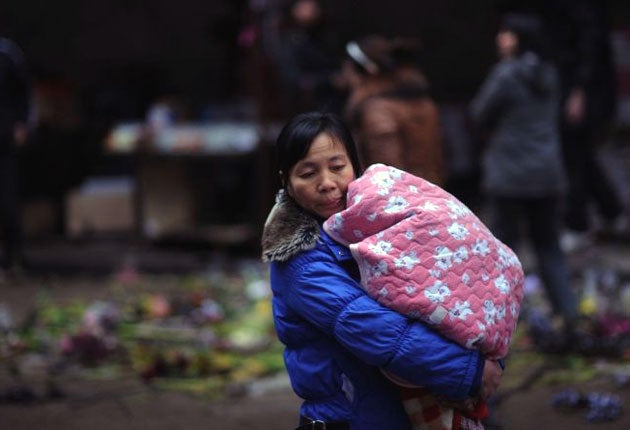China crisis as economy crumbles
An 8 per cent growth rate sounds impressive, but the Beijing leadership fears social unrest in the countryside as it struggles to create jobs

Your support helps us to tell the story
From reproductive rights to climate change to Big Tech, The Independent is on the ground when the story is developing. Whether it's investigating the financials of Elon Musk's pro-Trump PAC or producing our latest documentary, 'The A Word', which shines a light on the American women fighting for reproductive rights, we know how important it is to parse out the facts from the messaging.
At such a critical moment in US history, we need reporters on the ground. Your donation allows us to keep sending journalists to speak to both sides of the story.
The Independent is trusted by Americans across the entire political spectrum. And unlike many other quality news outlets, we choose not to lock Americans out of our reporting and analysis with paywalls. We believe quality journalism should be available to everyone, paid for by those who can afford it.
Your support makes all the difference.With China facing its worst financial crisis in a century, Premier Wen Jiabao assured comrades that the economy would still grow by 8 per cent this year, the level that the Communist Party believes is necessary to hold down the jobless rate and stave off wider social unrest.
"We are facing unprecedented difficulties and challenges," Mr Wen told nearly 3,000 delegates assembled in the Great Hall of the People. "In projecting the economic growth target of about 8 per cent, we have taken into consideration both our need and ability to sustain growth."
Until growth slowed to 9 per cent last year, China had enjoyed double-digit expansion for the previous five years. The government's prediction for this year was more optimistic than that of the International Monetary Fund, which has forecast growth of just 6.7 per cent for China. But Communist Party officials said 8 per cent growth was the make-or-break threshold for keeping the population satisfied and making sure that China does not fall victim to widespread rural unrest.
"Maintaining a certain growth rate for the economy is essential for expanding employment for both urban and rural residents, increasing people's incomes and ensuring social stability," Mr Wen said in a two-hour address.
China's economy is the third-largest after Japan and the US and will play a pivotal role in helping drag the global economy out of its downturn. But, to the chagrin of the markets which had been hoping for another shot in the arm, Mr Wen failed to announce any extension to the four trillion yuan (£414bn) stimulus package unveiled in November.
He did provide extra details fleshing out that stimulus package – the biggest in the world. The central government would increase spending on healthcare and other social welfare programmes, and bring in measures to spur domestic demand and get consumers spending, including subsidies for farmers to buy fridges and cars.
It would also take further steps to offset the rising number of unemployed, victims of a slump in the export market. Collapsing overseas demand for Chinese toys, shoes and electronics have caused the closure of 670,000 small and medium-sized companies. Officials estimate about 20 million migrant workers have already lost their jobs owing to the closure of export-dependent factories and many are now returning to their rural homes.
In the year that the Communist Party celebrates the 60th anniversary of the 1949 revolution, the fear is that people will start to question its power.
Chinese authorities have been training police forces to deal with potential labour unrest. President Hu Jintao has called on the army to remain loyal in the face of growing discontent at the first downturn many Chinese people have experienced. Last month, a clash between police and about 1,000 protesting workers from a textile factory in Zigong City, Sichuan province, left six demonstrators injured, according to the rights group Chinese Human Rights Defenders.
Mr Wen warned that the government would continue to prevent what it calls "mass incidents", its euphemism for riots, protests and demonstrations. "We will improve the early warning system for social stability to actively prevent and properly handle all types of mass incidents," he said.
The manner in which China is keeping a tight lid on social unrest was highlighted yesterday when a group of about 100 petitioners from Shanghai went to a Beijing police station to air their grievances but were quickly detained or dispersed. Petitioning is an ancient system dating from the imperial age, where Chinese people who felt they were being abused by the system turned to the Emperor for help, travelling to Beijing to petition for the assistance of the supreme authority.
It used to be that petitioners were heard during the National People's Congress, but fear of social unrest means those days are gone. Any petitioners seen near Tiananmen Square are rounded up and often jailed in "petitioners' hotels", a euphemism for detention centres.
Join our commenting forum
Join thought-provoking conversations, follow other Independent readers and see their replies
Comments